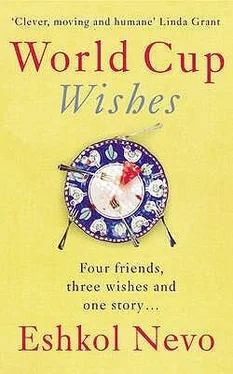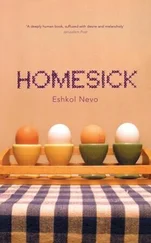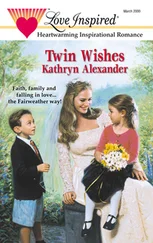Enough, Mum, enough, Hani pleaded.
Don’t tell me it’s enough, her mother continued lashing out at her. I hear that music in the background there. Have you no shame, Chana? To celebrate a Christian holiday? You know what, maybe you should just convert. Your man isn’t a Jew anyway, is he?
Hani didn’t answer. She didn’t even have the strength to utter that pleading ‘enough’. So she just breathed deeply into the mouthpiece and let her mother become more and more offensive. Until she said her usual, ‘I don’t want to hear from you. Don’t expect me to call you any more’ that closed their night-time conversations every time.
I don’t get it, why don’t you tell her I’m Jewish? I asked after a silence.
We were walking slowly along quick streets. A Robbie Williams song came from a building we passed.
I don’t know, Hani said, chastised.
And I don’t understand why you let her talk to you like that. Why do you even answer the phone?
Because … that’s her way … of keeping in touch with me. It’s our way of communicating now, Hani said.
The Robbie Williams song came out of the next building too. Rhythmic, happy, great.
Hani clung tightly to me, not trembling, not crying. Sorry I ruined tonight, she said.
You didn’t ruin anything, I said, tightening my arm around her shoulders, and I felt a slight warming in my chest. The kind you feel after a shot of vodka. I wasn’t sure what to call that warming — sadness? pity? love? — and I had no idea how long it would last. But I was afraid of risking everything by seeing Ya’ara. Even if we were both surrounded by people who’d be talking about Ilana’s nose. Even if we didn’t say a word to each other all evening.
The nagging thoughts about Ya’ara hadn’t stopped when I started going out with Hani. They actually intensified. I thought about Ya’ara when I was kissing Hani at the Coliseum. I thought about Ya’ara when I was having sex with Hani. I thought about Ya’ara when I was with Hani in the Ein Kerem Inn. I remembered that I’d planned to take her there, but I never got the chance. I thought about how I would feel if she were sitting across from me now with those green eyes of hers. And if she were to take off her glasses.
I was ashamed of those thoughts. And that I occasionally took out of the closet the single sock Ya’ara had left behind, a red sock with a yellow stripe at the top. There was nothing special about that sock, except for the fact that it was hers, but it alone was enough to make me feel a pang of yearning every time I touched the thin, feminine fabric and crushed it between my fingers (and that was just the half-normal perversion, the one I’m willing to admit without the protection of parentheses. There was also a video tape of the wedding, and I knew exactly which frames Ya’ara appeared in alone. And there were the chairs she’d sat in when the group met up and when she got up, I would sit on them quickly to feel the outline of her buttocks still left on the fabric. And there were others).
*
Sorry, man, it looks like you’ll have to manage without me this time, I told Amichai.
OK, he said without hiding his disappointment.
And tell your wife I wish her luck.
What are you talking about, he said. It’s just cosmetic surgery. She goes in at nine in the morning, and she’ll be home by five in the afternoon.
1Mr Freed’s normally accurate memory betrays him on this point. The quote from the Chameleons song did not appear in a birthday message I wrote him, but in a letter I sent him through Mr Amichai Tanuri, our mutual friend. At the time, Mr Freed was serving in a company of soldiers that handled day-to-day security matters in Judah and Samaria, and in that capacity was posted, along with another nine soldiers, on the roof of a building in Nablus. Further on in this book, Mr Freed describes at length the weeks he spent on that roof, and even quotes from the letter he wrote to me from there.
That letter aroused my concern, as well it should have. Mr Freed was always very restrained with regard to anything related to public expressions of distress, and most of the time used his self-deprecating humour to protect himself and those listening to him. But in the aforementioned letter, his distress and confusion were apparently too great to contain or turn into a joke. Reading his words, I sensed that the despair he was expressing might reach the point of no return.
Then too, like today, the thought of life — of the world — without him, seemed incomprehensible, unbearably sad, and I tried with every fibre of my being to choose the right words in my reply to cheer him up. In the end, it turns out, it was those words from the Chameleons song that left an impression on him. (Y.A.)
THE FOUR OF us are buried in sand, only our heads are sticking out. Ofir’s curly, unkempt head. Churchill’s wide, crew-cut head. Amichai’s round head. And my small, economy-size head. We worked for three hours on South Beach in the blazing July heat digging graves, and then it took the woman filming us another hour and a half to put the sand back and pat it down around our bodies so it’d look as if we couldn’t get out. I don’t remember what product it was that Ofir had to produce an ad for in his copywriting course. Life insurance? Nose drops? In any case, the four of us played people about to die (in the final edit, Ofir managed to include a shot of circling vultures he’d taken from some Western), and each of us had a short script, a sentence or two expressing regret for something he’d never managed to do during his life. I don’t remember my sentence. I just remember that Amichai had to say, ‘One woman. To have slept with only one woman since the age of twenty-two. What a waste, what a waste’, and that he couldn’t say it with the inner conviction Ofir was expecting, so they had to shoot that take over and over again, and my nose itched madly, and I had nothing to scratch it with because my hands were buried in sand, and the woman with the camera, someone from Ofir’s course, poured mineral water into our open mouths over and over again so we wouldn’t dehydrate. When I started to feel an unpleasant coldness spreading from my feet to my hips and waist, I thought, perhaps this is the coldness of death, perhaps this is what you feel when you die, and what would happen if I died now, in the middle of this day of shooting, and I was depressed to discover that I didn’t really care, I mean, I didn’t want to die, but at the moment, when my life wasn’t going anywhere, or more accurately, when it was going nowhere, I didn’t really care.
My thoughts must have been visible on my face because a week later, when Ofir ran the edited film in class, his teacher remarked that none of the men buried in the sand looked like they were about to die, except for the one on the left, the one with the small head, who was probably a professional actor.
*
Ofir was the one who told me.
Something terrible happened, he said on the phone. His voice was so salty that I didn’t recognise it at first.
But how? Churchill mumbled. It can’t … it can’t be.
There was some rare complication … with the anaesthesia … a blood clot … I explained to him what Ofir had explained to me.
The funeral’s tomorrow at one. We’re meeting at the gate to the Haifa cemetery, Ofir told us two hours later.
Can we call Amichai? I asked. Is he answering the phone now?
He’s not speaking. Not just to us, not to anyone, I explained to Churchill. Ilana’s brother has taken charge of making all the arrangements and he’s keeping Ofir up to date.
I’ll wait outside for you tomorrow at twelve, Ofir told me. I might come alone. Maria isn’t … Maria fell apart completely when she heard. I don’t know if she’ll be able to pull herself together by tomorrow.
Читать дальше












